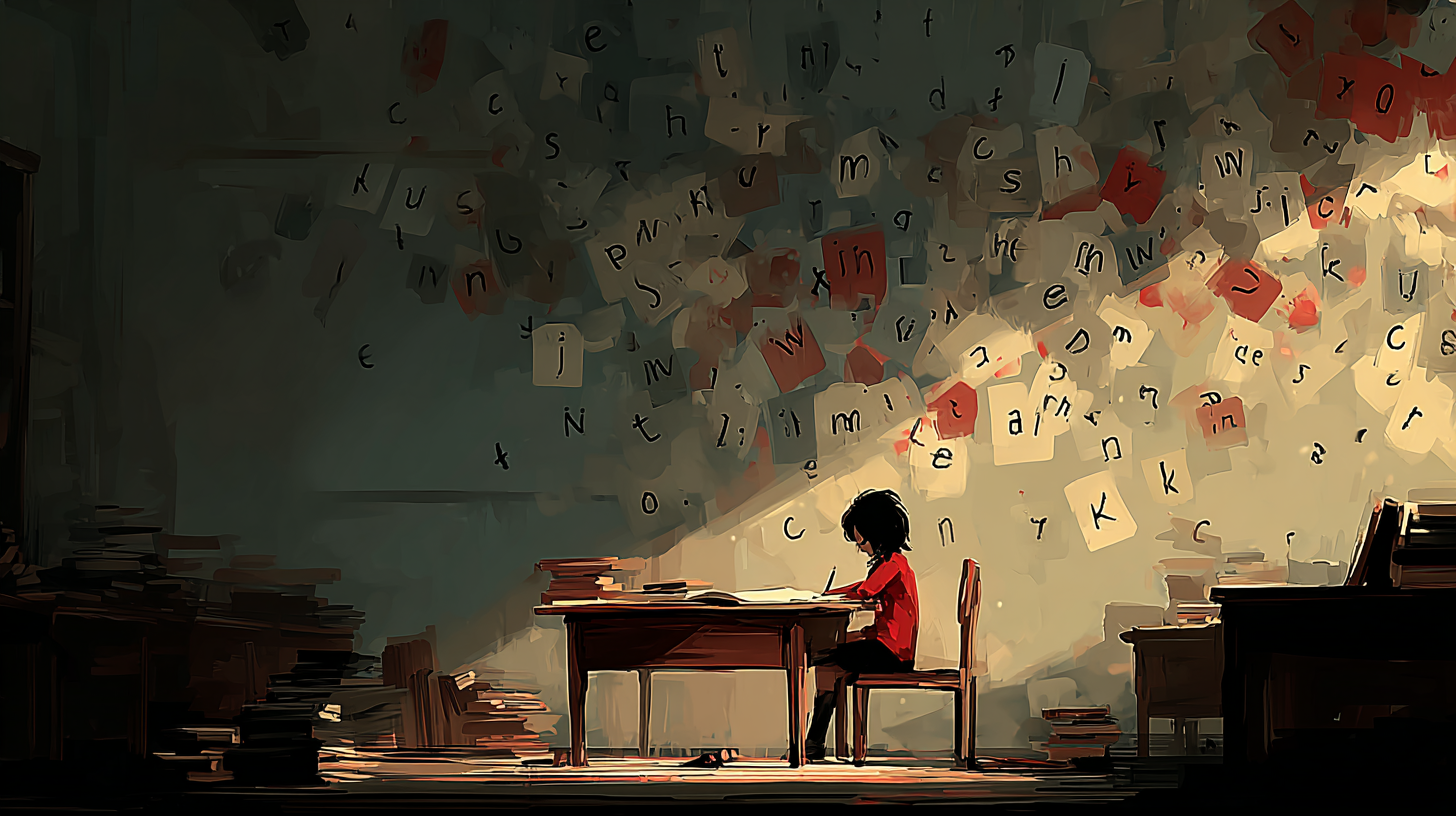“Rhyme” means two or more words have the same ending sound.
「rhyme」は、単語の終わりの音が同じになること。詩や歌でよく使われます。
以下は英単語 “rhyme” に関するストーリー型学習コンテンツです。まずは大枠の意味を理解して最後の文章で確認しましょう。
「rhyme」の主な意味(main meaning)
| 品詞 | 発音記号 | 意味 | 英語例文 |
|---|---|---|---|
| 名詞 (noun) | /raɪm/ | 同じ音で終わる単語の組み合わせ、韻 | The poet used a clever rhyme at the end of each line. |
| 動詞 (verb) | /raɪm/ | 韻を踏む、同じ音で終わる | “Cat” rhymes with “hat”. |
「rhyme」の語源(etymology)
「rhyme」は古フランス語のryme、さらにラテン語の*rhythmus(リズム)*に由来します。
もともとは「リズム」や「音の繰り返し」のイメージが核です。
「rhyme」の類義語(synonyms)
| 類義語 | 英語例文 |
|---|---|
| rhythm | The song has a nice rhythm. |
| verse | She wrote a verse about nature. |
| poem | He read a beautiful poem to the class. |
| jingle | The commercial had a catchy jingle. |
| cadence | The speaker’s cadence made the story more interesting. |
「rhyme」の反義語(antonyms)
| 反義語 | 英語例文 |
|---|---|
| prose | Unlike rhyme, prose does not follow a regular pattern. |
| dissonance | The song lacked rhyme and had some dissonance instead. |
「rhyme」のコロケーション(collocations)
| コロケーション | 英語例文 |
|---|---|
| rhyme scheme | The poem follows an ABAB rhyme scheme. |
| nursery rhyme | “Twinkle, Twinkle, Little Star” is a nursery rhyme. |
| perfect rhyme | “Sky” and “high” are examples of a perfect rhyme. |
| internal rhyme | Internal rhyme occurs within a single line of poetry. |
| rhyme and rhythm | Good poems have both rhyme and rhythm. |
「rhyme」の2項表現(binomials)
| 2項表現 | 英語例文 |
|---|---|
| rhyme and reason | There’s no rhyme and reason to his actions. |
| rhythm and rhyme | The song’s rhythm and rhyme made it memorable. |
英語ストーリー(english story)
Title: The Power of a Rhyme
Lena was a young English teacher at a small school. She loved poems, especially those with a perfect rhyme. One day, she gave her students a challenge.
“I want each of you to write a short poem with at least three rhymes,” she said with a smile.
Tom raised his hand. “What’s a rhyme again?”
Lena replied, “When two words sound the same at the end, like ‘cat’ and ‘hat’, they rhyme.”
The class laughed and started writing. One student, Yuki, had never written a verse before. But she loved songs, especially nursery rhymes. So she used her favorite melody to create a jingle about her cat.
Her poem was simple but had a clear rhyme scheme. It even had internal rhyme. When she read it aloud, everyone clapped. Lena said, “That had both rhythm and rhyme! Great job!”
Another student asked, “Why do we need rhymes?”
Lena answered, “They help us remember. And they make language fun.”
Later, Tom tried writing again but got frustrated. “This has no rhyme or reason!” he said.
Lena encouraged him, “Even prose can be beautiful. But give it another try.”
By the end of the week, every student wrote something. Some used cadence, others made it funny. Lena smiled. “You’ve all learned that rhyme isn’t just for poetry. It’s a way to play with language.”
和訳
タイトル:ライムの力
リナは小さな学校の若い英語教師でした。彼女は詩、特に**rhyme(韻)のある詩が大好きでした。ある日、彼女は生徒たちに課題を出しました。
「みんな、それぞれrhyme(韻)を3つ以上使った短いpoem(詩)**を書いてみてね」と笑顔で言いました。
トムが手を挙げました。「先生、rhymeって何でしたっけ?」
リナは答えました。「単語の終わりの音が同じなら、例えば ‘cat’ と ‘hat’ は**rhyme(韻)**を踏んでいるのよ。」
クラスのみんなは笑って、すぐに書き始めました。ユキという生徒は、今まで**verse(詩の一節)を書いたことがありませんでした。でも彼女は歌が大好きで、特にnursery rhyme(子どもの歌)が好きでした。それで、お気に入りのメロディーに乗せて、飼い猫についてのjingle(短い歌)**を作りました。
彼女の詩はシンプルでしたが、きちんとした**rhyme scheme(韻律構成)**があり、**internal rhyme(行内韻)**も含まれていました。彼女が音読すると、みんなが拍手しました。リナ先生は「**rhythm and rhyme(リズムと韻)**が両方あったね!すばらしい!」と言いました。
別の生徒が聞きました。「どうして韻が大事なんですか?」
リナは答えました。「記憶に残りやすくなるし、言葉が楽しくなるからよ。」
その後トムは再び書こうとしましたが、イライラして言いました。「これには**rhyme or reason(理屈も韻も)**がないよ!」
リナは励ましました。「**prose(散文)**も美しいわ。でも、もう一度挑戦してみて。」
週の終わりには、全員が何かを書き上げていました。**cadence(抑揚)**を使った生徒もいれば、面白い詩を書いた子もいました。リナはほほえみました。「みんな、rhymeはただの詩じゃなくて、言葉を楽しむ方法だってわかったわね。」
「rhyme」のQ&A
- Qライム(rhyme)の類義語である「rhythm」との違いは何ですか?
- A
「rhythm(リズム)」は音の強弱や繰り返しのパターンを表します。一方「rhyme(ライム)」は、単語の語尾の音が一致することを指します。どちらも詩や歌に使われますが、役割が異なります。
- Q「verse」は「rhyme」と同じ意味ですか?
- A
「verse(詩の一節)」は、詩や歌のまとまりある一行や段落を指します。「rhyme(ライム)」はその中で使われる音の一致(韻)を意味します。つまり、verseの中にrhymeが使われることがあります。
- Q「jingle」は「rhyme」とどのように関係していますか?
- A
「jingle(ジングル)」は短くて記憶に残るように作られた歌やフレーズで、よくCMなどに使われます。多くの場合、韻(rhyme)が含まれていて耳に残りやすくなっています。
- Q「prose(散文)」は「rhyme」と反対の意味ですか?
- A
「prose(散文)」は詩のようなリズムや韻を持たない、普通の話し言葉や文章のことです。したがって、「rhyme(韻)」を多用する詩とは対照的な形式とされます。
- Q「rhyme or reason」という表現の意味は何ですか?
- A
「rhyme or reason」は「理屈も理由もない」という意味の決まり文句です。ここでは「rhyme」は比喩的に使われていて、論理や秩序がないことを示しています。
- Q「nursery rhyme」とは何ですか?
- A
「nursery rhyme(ナーサリーライム)」は、子ども向けの簡単で韻を踏んだ詩や歌のことです。たとえば「Twinkle, Twinkle, Little Star」などが有名です。
- Q「rhyme scheme」とは何を指しますか?
- A
「rhyme scheme(韻律構成)」は、詩の各行の語尾がどのように韻を踏んでいるかのパターンを表したものです。たとえば「AABB」や「ABAB」などがあります。
| 単語 | 意味(やさしい言葉) | 使われ方(場面) | 例文(日本語訳つき) |
|---|---|---|---|
| rhyme | 言葉の終わりの音がそろって響くこと | 詩や歌で、言葉の最後をそろえて響かせる場面 | “cat” と “hat” は rhyme します。(cat と hat は韻を踏んでいる) |
| verse | 詩の一行(または連) | 詩や歌詞などの構成単位。「rhyme」が含まれることが多い | I wrote a verse for the poem. (詩の一節を書いた) |
| sound-match | 音の一致(rhymeのやさしい言い換え) | 子ども向け英語教材やカジュアルな説明で「音が合ってる」ことを表す | “blue” and “you” are a sound match. (blue と you は音が合っている) |
| poem | 詩(詩全体のこと) | 芸術的な文や感情をこめた短い文章。rhyme が含まれることもある | He wrote a love poem. (彼はラブポエムを書いた) |
| rhythm | 音のリズム・流れ | 音楽や詩で「音のテンポ・心地よい流れ」に使う | The rhythm of the poem is very smooth. (その詩のリズムはとてもなめらかです) |
| meter | 詩の中の音節のパターン・リズムの構造 | 韻律と呼ばれる構成。英詩や文学での専門用語。詩における「音のルール」 | The poem is written in iambic meter. (その詩は弱強格の韻律で書かれている) |
ニュアンスまとめ
- rhyme:言葉の最後の音がそろっている(例:cat, hat)
- verse:詩の一節(rhyme を含むことも多い)
- sound-match:rhyme のやさしい説明。音がそろっている
- poem:詩の全体。rhyme があってもなくてもOK
- rhythm:リズムやテンポ。音の心地よさに注目
- meter:詩の音節パターン(専門用語)。リズムのルール



コメント